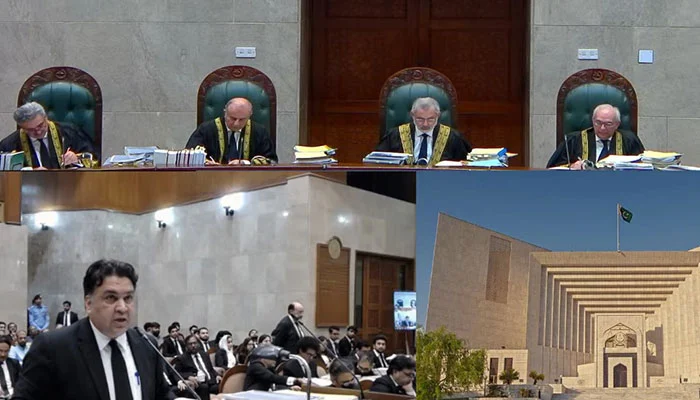ISLAMABAD: The Supreme Court has declared the decision of the Election Commission of Pakistan (ECP) and the Peshawar High Court (PHC) and null and void and declared PTI eligible for reserved seats in the National Assembly and provincial assemblies.
Giving 15 days to former Prime Minister Imran Khan’s party to submit lists for reserved seats to the ECP, the top court said that PTI was and is a political party.
The Supreme Court declared that the deprivation of an election symbol does not terminate the right of a party to participate in elections. The electoral body submitted the data of 80 candidates to the Supreme Court, out of which 39 were shown their affiliation with PTI. The remaining 41 candidates can also submit their affidavits within 15 days that they were candidates of the same party. With 8-5 majority, the top court declared PTI eligible for reserved seats and ordered the party to submit its lists for reserved seats within 15 days.
Justice Mansoor Ali Shah, with all 13 judges including the Chief Justice of Pakistan participating, announced the 11-2 majority verdict, nullifying the Peshawar High Court’s order.
However, the top court upheld a part of the Peshawar High Court’s verdict that says SIC is not illegal for reserved seats. The reserved seats will be given to the PTI.
Earlier, the full court held meetings for two consecutive days. All the judges – Justice Syed Mansoor Ali Shah, Justice Yahya Afridi, Justice Muneeb Akhtar, Justice Jamal Khan Mandokhail, Justice Aminuddin Khan, Justice Ayesha A. Malik, Justice Athar Minallah, Justice Muhammad Ali Mazhar, Justice Syed Hassan Azhar Rizvi, Justice Irfan Saadat Khan, Justice Shahid Waheed, and Justice Naeem Akhtar Afghan – attended the meeting.
The Supreme Court of Pakistan on Tuesday reserved the decision on the Sunni Ittehad Council’s (SIC) plea against the Peshawar High Court’s (PHC) verdict upholding the Election Commission of Pakistan’s (ECP) decision denying them the reserved seats.
A 13-member full court bench led by Chief Justice of Pakistan (CJP) Qazi Faez Isa heard the case, with Barrister Salman Akram Raja and SIC’s Faisal Siddiqui presenting their arguments before the apex court.
The reserved seats matter first emerged following the Pakistan Tehreek-e-Insaf (PTI) backed independent candidates who emerged victorious in the February 8 polls and subsequently joined the SIC in a bid to claim seats reserved for women and minorities.
However, the PTI suffered a setback following the ECP, quoting the party’s failure to submit its list of candidates, and refused to allocate the reserved seats to the SIC. The party then approached the Peshawar High Court, which upheld the electoral body’s decision on the issue.
Subsequently, the SIC knocked on the door of the SC, seeking to set aside the PHC decision and the allocation of 67 women and 11 minority seats in the assemblies.
The allocation of reserved seats holds significance as the PTI-backed independent candidates, who make up the majority of the opposition benches, lost as many as 77 reserved seats in NA and provincial assemblies due to the PHC’s verdict.
The SIC’s appeal, however, has been opposed by both the federal government and the Election Commission of Pakistan. In its submission to the apex court via Attorney General of Pakistan (AGP) Mansoor Usman Awan, the government has pleaded with the court to reject the SIC’s appeal, stressing that the reserved seats for women and minorities could be given to a political party which contested the elections and won at least one seat besides providing a list of candidates based on the total number of seats it won as per the rules and law. The ECP has adopted a somewhat similar argument, contending that the party is not eligible to get reserved seats as it did not submit the list of candidates before the deadline.


